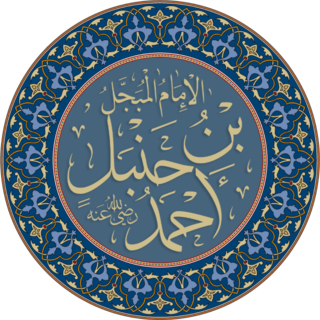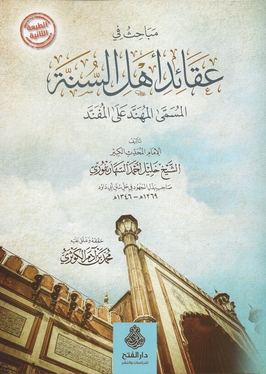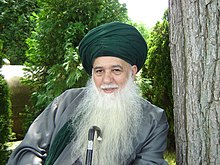
Sufism is a mystic body of religious practice found within Islam which is characterized by a focus on Islamic purification, spirituality, ritualism, asceticism, and esotericism.
Sunni Islam is the largest branch of Islam, followed by 85–90% of the world's Muslims, and simultaneously the largest religious denomination in the world. Its name comes from the word Sunnah, referring to the tradition of Muhammad. The differences between Sunni and Shia Muslims arose from a disagreement over the succession to Muhammad and subsequently acquired broader political significance, as well as theological and juridical dimensions. According to Sunni traditions, Muhammad left no successor and the participants of the Saqifah event appointed Abu Bakr as the next-in-line. This contrasts with the Shia view, which holds that Muhammad appointed his son-in-law and cousin Ali ibn Abi Talib as his successor.

Ahmad ibn Hanbal was a Sunni Muslim scholar, jurist, theologian, traditionist, ascetic and eponym of the Hanbali school of Islamic jurisprudence—one of the four major orthodox legal schools of Sunni Islam. The most highly influential and active scholar during his lifetime, Ibn Hanbal went on to become "one of the most venerated" intellectual figures in Islamic history, who has had a "profound influence affecting almost every area" of the traditionalist perspective within Sunni Islam. One of the foremost classical proponents of relying on scriptural sources as the basis for Sunni Islamic law and way of life, Ibn Hanbal compiled one of the most significant Sunni hadith collections, al-Musnad, which has continued to exercise considerable influence on the field of hadith studies up to the present time.

Abu 'Abd Allah Muhammad ibn al-Khafif (882-982) known as al-Shaykh al-Kabir or Shaykh al-Shirazi was a Persian mystic and sufi from Iran. He is credited with bringing Sufism (tasawwuf) to Shiraz.

Al-Sayyid Muhammad al-Hasan bin ‘Alawi bin ‘Abbas bin ‘Abd al-‘Aziz (1944–2004), also known as Muhammad ibn Alawi al-Maliki, was one of the foremost traditional Sunni Islamic scholar of contemporary times from Saudi Arabia. He is considered to be the Mujaddid of 20th-21st century.

Shaykh al-Islām was used in the classical era as an honorific title for outstanding scholars of the Islamic sciences. It first emerged in Khurasan towards the end of the 4th Islamic century. In the central and western lands of Islam, it was an informal title given to jurists whose fatwas were particularly influential, while in the east it came to be conferred by rulers to ulama who played various official roles but were not generally muftis. Sometimes, as in the case of Ibn Taymiyyah, the use of the title was subject to controversy. In the Ottoman Empire, starting from the early modern era, the title came to designate the chief mufti, who oversaw a hierarchy of state-appointed ulama. The Ottoman Sheikh al-Islam performed a number of functions, including advising the sultan on religious matters, legitimizing government policies, and appointing judges.

Abū Bakr Aḥmad ibn Ḥusayn ibn ʿAlī ibn Mūsā al-Khusrawjirdī al-Bayhaqī, also known as Imām al-Bayhaqī, was a Sunni scholar widely known for being the foremost leading hadith master in his age, leading authority in the Shafi'i school, leading authority on the foundation of doctrine, meticulous, a devoted ascetic and one of the notable defenders of the Ash'ari school. Al-Dhahabi said: "Unequalled in his age, unrivalled amongst his peers, and the Ḥāfiẓ of his time."

The Uwaisī silsila or tariqa (pathway) is a form of spiritual transmission in the vocabulary of Sufism, named after Owais al-Qarani. It refers to the transmission of spiritual knowledge between two individuals without the need for direct interaction between them.

The Ba'Alawi tariqa, also known as the Tariqa Ba Alawiyya is a Sufi order centered in Hadhramawt, Yemen, but now spread across the Indian Ocean rim along with the Hadhrami diaspora. The order is closely tied to the Ba'Alawi sadah family.

Al-'Aqida al-Tahawiyya or Bayan al-Sunna wa al-Jama'a is a popular exposition of Sunni Muslim doctrine written by the tenth-century Egyptian theologian and Hanafi jurist Abu Ja'far al-Tahawi.

Salafi–Sufi relations refer to the religious, social and political relations between Salafis and Sufis, who represent two major scholarly movements which have been influential within Sunni Muslim societies. The debates between Salafi and Sufi schools of thought dominated the Sunni world since the classical era, splitting their influence across religious communities and cultures, with each school competing for scholarly authority via official and unofficial religious institutions. The relationship between Salafism and Sufism – two movements of Islam with different interpretations of Islam – is historically diverse and reflects some of the changes and conflicts in the Muslim world today.

Anwar al-Tanzil wa-Asrar al-Ta'wil, better known as Tafsir al-Baydawi, is one of the most popular classical Sunni Qur'anic interpretational works (tafsir) composed by the 13th-century Muslim scholar al-Baydawi (d.1319), flourished especially among non-Arab Muslim regions. This work is based on the earlier work of al-Zamakhshari's al-Kashshaf. Al-Kashshaf, which has Mu'tazilite views, some of which al-Baydawi has amended, and some omitted. Tafsir al-Baydawi is also based on al-Raghib al-Isfahani's Mufradat Alfaz al-Qur'an and his tafsir, as well as al-Tafsir al-Kabir by Fakhr al-Din al-Razi.
Qutb ud-Din Ahmad ibn ʿAbd-ur-Rahim al-ʿUmari ad-Dehlawi, commonly known as Shah Waliullah Dehlawi, was an Islamic Sunni scholar and Sufi of the Naqshbandi order, who is seen by his followers as a renewer. He emphasized the importance of following Sharia and believed in the unification of Hanafi and Shafi'i schools of law, aiming to reduce legal differences.
Gibril Fouad Haddad is a Lebanese-born Islamic scholar, hadith expert (muhaddith), author, and translator of classical Islamic texts. He was featured in the inaugural list of The 500 Most Influential Muslims and has been called "one of the clearest voices of traditional Islam in the Western world", a "prominent orthodox Sunni" and a "staunch defender of the traditional Islamic schools of law." He holds ijazas from over 150 scholars across the Muslim world. He was a visiting fellow (2013-2015) then senior assistant professor (2015-2018) at the Sultan Omar Ali Saifuddin Center for Islamic Studies, Universiti Brunei Darussalam. He is also a staunch critic of Wahhabism and Salafism.
'Ala' al-Din al-Bukhari, was a Hanafi jurist (faqih), Maturidi theologian, commentator of the Qur'an (mufassir), and a mystic (Sufi).

Al-Muhannad 'ala al-Mufannad, also known as al-Tasdiqat li-Daf' al-Talbisat, was subsequently published in Urdu as 'Aqa'id 'Ulama' Ahl al-Sunna Deoband is a book that expresses some of the beliefs held by the Sunni Hanafi Deobandis. It was authored by the Indian Hanafi-Maturidi hadith scholar and Sufi master Khalil Ahmad al-Saharanpuri in 1907, who wrote a commentary on Sunan Abi Dawud, entitled Badhl al-Majhud.

Al-Risala al-Qushayriyya fi 'Ilm al-Tasawwuf, mostly known as al-Risala al-Qushayriyya, is one of the early complete manuals of the science of Sufism, written by the Shafi'i-Ash'ari scholar Abu al-Qasim al-Qushayri. It was written in 438/1045–6 and has been published in several editions and translated in various languages, including English, French, German, Persian, Turkish, and Urdu. It became the most widely disseminated handbook of Sufism in the Islamic world.
Al-Sabuni, Ismail bin Abdal-Rahman bin Ahmad bin Ismail bin Ibrahim bin Amir, Abu Uthman al-Sabuni al-Shafi'i also known as Abu Uthman al-Sabuni, was a Sunni scholar known for being the leading hadith expert in Khorasan, a jurist of great authority particularly in the Shafi'i school, a Qur'anic exegete, theologian, preacher, and orator. The Sunnis of his time called him the Shaykh al-Islām, and when they used this word they did not mean anyone else. He was eloquent in dialect, broad in knowledge, and was fluent in both Persian and Arabic. Al-Bayhaqi said: "He was the true Imam of the Muslims and the real Shaykh of Islam."
Tanbih al-Ghabi bi-Tabri'at Ibn 'Arabi is a booklet written by the Shafi'i-Ash'ari scholar Jalal al-Din al-Suyuti as a response to the book Tanbih al-Ghabi ila Takfir Ibn 'Arabi by Burhan al-Din al-Biqa'i in which al-Suyuti defended Ibn 'Arabi against his critics in general, and against accusations of heresy and unbelief by al-Biqa'i in particular. Al-Suyuti said:
The scholars past and present have differed concerning Ibn 'Arabi, one group considering him a wali of Allah - and they are correct - such as Ibn 'Ata' Allah al-Sakandari and 'Afif al-Din al-Yafi'i, another considering him a heretic - such as a large number of the jurists - while others expressed doubts concerning him, among them al-Dhahabi in al-Mizan. Two opposed verdicts are reported from Shaykh 'Izz al-Din ibn 'Abd al-Salam, one attacking him, and one describing him as the Spiritual Pole (al-Qutb). What reconciles them is indicated by Shaykh Taj al-Din ibn 'Ata' Allah in Lata'if al-Minan, namely, that Shaykh 'Izz al-Din at the beginning acted in the fashion of jurists in passing quick judgment on the Sufis. When Shaykh Abu al-Hasan al-Shadhili went to pilgrimage and returned, he came to Shaykh 'Izz al-Din before entering his own house and conveyed to him the Prophet's ﷺ greeting. After that, Shaykh 'Izz al-Din humbled himself and began to sit in al-Shadhili's gatherings...










